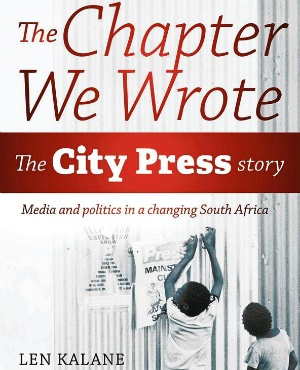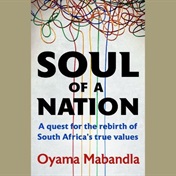
BOOK EXTRACT
The Chapter We Wrote – The City Press story
by Len Kalane
Jonathan Ball Publishers
286 pages
R260
The lift doors opened to deliver Percy Qoboza on to the carpeted ground floor.
He emerged, brow glistening. He walked straight across the swanky hotel lobby to
where I was. In his usual melodramatic manner, hands gesticulating, he signalled that we should leave at once.
He had made his way down, I think he said, from the 17th floor of the pristine, five-star Landdrost Hotel in Plein Street, Johannesburg, where, he told me, “Lang Dawid” de Villiers, the managing director of Nasionale Pers, had a permanent suite reserved for his exclusive use.
Thirty years ago, the Landdrost Hotel was the citadel of Afrikanerdom in Johannesburg. The Johannesburg CBD is now run-down and the glorious Landdrost is no more. Then, Johannesburg was still Johannesburg – the model African city of gold. Maboneng, Egoli, Jozi, Mgipa, Mshishi, TJ.
Across from the Landdrost stood the Putco bus terminal, which facilitated the transportation of many thousands of passengers each day from places such as Sophiatown and Alexandra through the CBD. The terminal was clean, and law and order was maintained.
However, the occasional gunshot would ring out – this was Noord Street, after all – and the increasing urbanisation of the townships meant a degree of criminality was bound to flourish.
The Landdrost has been transformed into a low-grade apartment block (Landrost Mansions) that houses lower-income inner-city tenants.
It has suffered the same fate as most apartment blocks in the pulsating Hillbrow flatlands, which was once Johannesburg’s own Manhattan-style, round-the-clock live-and-play magnet, with attractive, psychedelic neon lights that were always illuminated.
Today, the old Landdrost is surrounded by mass of human activity and noise brought to you courtesy of the Noord Taxi Rank, which usurped the Putco terminal and where scores of vehicles arrive and depart for all corners of the country, generating a momentous cacophony. The kwaito, gospel, maskandi and House music that blares from the taxis competes for attention with screeching tyres and drivers’ ceaseless hooting, a jarring racket that is guaranteed to drive any casual and uninitiated visitor to the precinct utterly crazy.
On the afternoon I was with Qoboza at the Landdrost, a Wednesday in the autumn of 1984, he must have downed something very strong up there on the 17th floor when he heard the news.
We had taken a few strides towards our car, when, wincing under the weight of the information, the words poured out: “We have been sold – lock, stock and barrel. City Press, Drum and True Love now belong to Nasionale Pers.”
It hit me like a bolt of lightning out of the clear blue sky; there had been no warning, and the implications were obvious and huge.
Jim Bailey, the publisher, had always played his cards close to his chest. No one had had an inkling that City Press, Drum and True Love were about to be sold to what would later be known as Naspers – the name changed from Nasionale Pers as the Afrikaans-language media company began to drift away from the ruling National Party.
We were unsure about how the news would be received. The staff at City Press and Drum had diverse political views, and most held strongly to those views. Others were known political activists. As a newspaper, City Press itself was ferociously
anti-apartheid and fiercely subversive in its editorial tone.
I also wasn’t too sure how Qoboza felt about all of this. Driving back to the office, he was still deep in thought when I broke the awkward silence: “What is your take ... are we staying?”
He appeared uncertain as he answered in a low tone: “I guess so.” Clearly, there was a lot to think about.
Qoboza, the associate editor, had been at City Press for barely a year.
The editor was Phillip Selwyn-Smith, whose position was thought of as “paradoxical as he was a white man in a predominantly black newspaper that had definitely nailed its colours to the anti-apartheid
mast”, as Mandy de Waal wrote in Daily Maverick on the occasion of City Press’ 30th birthday in 2012.
Qoboza, whom we fondly called PQ, would be appointed as editor in 1986, a day after the launch of the Congress of South African Trade Unions (Cosatu), which would go on to shape both the South African labour front and alliance politics with the ANC.
The new owners knew his buy-in would be crucial, because the transaction was so sensitive and had implications on many fronts, chiefly political.
A staff walkout led by the high-profile and influential Qoboza would have been disastrous, hence the rendezvous at the Landdrost Hotel to sensitise and gauge attitudes.
Qoboza was part of a handpicked delegation invited to the Landdrost ahead of the announcement. Drum editor Stan Motjuwadi and True Love editor Barney Cohen were also there. A walkout by Motjuwadi would have been equally disastrous.
I was sworn to secrecy, as I had no business being there in the first place – I was simply Qoboza’s chaperone. He had asked me to accompany him so that I could do the driving. Although he was 19 years older than me, we had a special relationship and he was fond of taking me along on sensitive missions. At the time, I was City Press’ deputy news editor and I had his ear.
As staff, we took our cue from Qoboza and Motjuwadi. There was some relief when, after the news of the buyout was made public, no walkout took place. We were now officially employees of Naspers, a known supporter at the time of the National Party.
Some saw this as political suicide for Qoboza and Motjuwadi, who had amassed formidable struggle credentials over the years.
At the time, Naspers and its stable of Afrikaans-language newspapers and magazines were key in driving apartheid and the National Party’s white-minority voter base at the expense of the disenfranchised black majority.
Apartheid architects such as HF Verwoerd and DF Malan had served as editors of Afrikaans publications, and even PW Botha sat on Naspers’ board for 10 years from 1966.
It has since been revealed that the National Party also held 74 000 shares in Naspers in 1984, so the fortunes of the ruling party and Naspers were cosily intertwined over a considerable period of time.
In 1984, the country was on fire. Resistance to the National Party’s racial and segregationist apartheid policies had gone into overdrive. Emotions were running high in the townships, and some people, especially staff members who were part of the township community, probably felt conflicted by the Naspers deal.
Everybody was caught by surprise. The staff took the news with what could, at best, be described as a perfunctory nod or, at worst, apathy. People were probably reticent to express their thoughts and feelings. There was little visible emotion or internal distress, and only some external detractors seemed to have had something to say.
The sale to Naspers pointed sharply to one thing: Bailey had once again run himself into a sticky financial situation and couldn’t keep things afloat. This time around, to his credit, he didn’t just arbitrarily shut the paper down and dump everything – as he had done previously – but had the sense to save jobs and careers by selling to Naspers, whose offer was worth millions.




 Publications
Publications
 Partners
Partners











